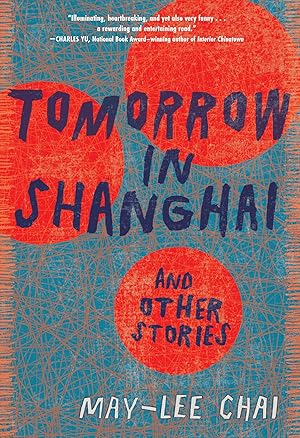« older | Main Largehearted Boy Page | newer »
August 30, 2022
May-Lee Chai's Playlist for Her Story Collection "Tomorrow in Shanghai"
In the Book Notes series, authors create and discuss a music playlist that relates in some way to their recently published book.
Previous contributors include Jesmyn Ward, Lauren Groff, Bret Easton Ellis, Celeste Ng, T.C. Boyle, Dana Spiotta, Amy Bloom, Aimee Bender, Roxane Gay, and many others.
May-Lee Chai's marvelously diverse collection Tomorrow in Shanghai is filled with members of the Chinese diaspora searching for home and family.
Publishers Weekly wrote of the book:
"This slim but wide-ranging work is a great achievement."
In her own words, here is May-Lee Chai's Book Notes music playlist for her story collection Tomorrow in Shanghai:
All the stories in Tomorrow in Shanghai are about Chinese or Chinese Americans in Diaspora yearning for a home that feels safer, a family that’s more accepting and loving, a future that is promising and bright.
I wrote the majority of the stories in this collection either during the last hideous U.S. administration or during the global pandemic, amid waves of anti-Asian hate attacks. None of the stories is actually set during this contemporary time period, and that is by design. I wanted to show that there’s nothing new about the violence of capitalism, anti-Asian bigotry, homophobia, and misogyny. I also wanted to capture the feeling of living through a difficult historical moment while still trying to practice hope.
1) Zhou Xuan “Shanghai Nights”周·璇 夜上海
In the title story, one of the characters who’s been hired to extract the organs of an executed prisoner imagines that his life will be better “tomorrow in Shanghai.” Shanghai is a wealthy, sophisticated, cosmopolitan city, and serves as a metaphor for a better, brighter future where he imagines his problems will be over. This song, first recorded in 1949, conveys the sense of potential of the city both for prosperity but also for sleepless nights and inner sadness beneath a smiling veneer.
In “Life in Mars,” a teenager from China is sent by his parents to live with his uncle and aunt in a small isolated town in Colorado, where he finds life in America is nothing as he had imagined it would be. As he tries to understand the alien world where he’s landed, I was inspired in part by my father’s experiences as a “parachute kid.” At age 17, he was sent alone by his own parents in Taiwan to a small town in the U.S. and instructed to find a sponsor for the rest of the family. These experiences made me think of Elton John’s rock classic.
3) The Linda Lindas “Racist, Sexist Boy”
I wrote “The Monkey King of Sichuan” for every woman who’s ever been sexually harassed by her professor and then been gaslighted about it. Misogyny starts early, and so I’m grateful to The Linda Lindas for calling it out young.
4) Serge Gainsbourg and Brigitte Bardot, “Bonnie & Clyde”
In my story “Hong’s Mother,” a biracial Chinese American college student goes on a spring break trip with her very religious White mother to Lourdes, France. Her mother wants to collect some holy water, but then things take an unexpected turn. I felt this classic duet by Serge Gainsbourg and Brigitte Bardot captured the gangster spirit that sweeps over this mother and daughter duo.
5) Japanese Breakfast “The Body Is a Blade”
My story “White Rabbits” is about a cultural discombobulation, about losing the person you feel most connected to and then trying to reconnect with your culture after their passing. I am reminded of Michelle Zauner’s own moving journey with grief and loss and culture as in her song, “The Body Is a Blade” performed by Zauner and her band, Japanese Breakfast.
6) Boy George and Culture Club, “Do You Really Want to Hurt Me”
My story “Jia” is set in the early 1980s and shows a mixed-race family’s travails in a town that disapproves of their love. For me, Culture Club’s “Do You Really Want to Hurt Me” captures the era and Boy George’s beautiful voice expresses so well the longing of the main character, Lu-lu, for love and acceptance.
7) Sinead O’Connor “Nothing Compares 2 U”
I felt one story in the collection should be a love story and so that became “Slow Train to Beijing.” Sinead O’Connor’s live rendition of “Nothing Compares 2 U” always struck me as a great romantic song because it is not smooth or sweet but rough-edged with a signature howl.
8) Karen O and Danger Mouse “Woman”
In my story “The Nanny” an older Chinese woman is working on the New Shanghai Colony on Mars as a nanny for a mysterious and secretive employer. It’s about going to great lengths to help out your family, as so many immigrant women have done, but it’s also about the friendships between women, and the power in those friendships. The Karen O and Danger Mouse song “Woman” conveys this power so well!
May-lee Chai is the author of the American Book Award-winning story collection Useful Phrases for Immigrants and ten other books. Her prize-winning short prose has been published widely, including in the New England Review, Missouri Review, Seventeen, The Rumpus, ZYZZYVA, the Los Angeles Times, Dallas Morning News, and the San Francisco Chronicle. The recipient of an NEA fellowship in prose, Chai is an associate professor in the Creative Writing Department at San Francisco State University.
If you appreciate the work that goes into Largehearted Boy, please consider making a donation.






